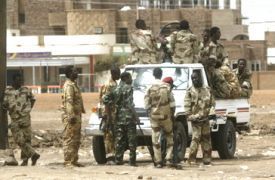Violence grips Khartoum neighbourhoods
KHARTOUM, Aug 3 (AFP) — Several southerners were killed in retaliatory raids in the Sudanese capital launched by northern Muslims early Wednesday following riots sparked by the death of southern rebel leader John Garang, residents said.

|
|
Sudanese soldiers on foot and in a pick-up are on patrol in the street of Khartoum, after riots continued to rock the Khartoum neighbourhood where Sudanese First VP John Garang used to live, Wednesday Aug. 3, 2005. (AFP). |
The worst of the latest violence took place in mixed neighbourhoods on the outskirts of Khartoum but clashes also briefly broke out in the city centre, witnesses said.
An AFP reporter was driven out by security forces a few minutes after entering the Sudanese capital’s eastern neighbourhood of Hajj Yusef, where Garang lived until he returned to the bush in 1983.
Several residents told AFP by phone that deadly clashes had taken place in the southern-majority neighbourhood of Hajj Yusef overnight and that the situation remained extremely tense Wednesday.
“One person was shot in the head by soldiers near my house overnight and another three on Monday,” Margaret Deng told AFP, mentioning reports from friends and relatives that many more were killed in other areas.
The violence followed riots that broke out on Monday and had left at least 46 people dead and 305 wounded by Tuesday night, according to Sudan’s deputy police chief, General Sayed Othman.
It was not immediately possible to obtain an accurate death toll for the latest violence as many other bodies were not taken to hospitals and morgues, but rather to mosques or directly to homes.
The first riots broke out on Monday, following the announcement that Garang’s helicopter had crashed in the Amatonj mountains near south Sudan’s border with Uganda and Kenya. The accident was blamed on bad weather but many southerners believe their leader was assassinated.
According to police sources, 300 southern Sudanese were arrested on Tuesday.
“They were suspected of involvement in Monday’s riots and their homes were searched. Stolen items were found, including lots of mobile phone sets, apparently looted from shops they vandalised,” one officer said on condition of anonymity.
In a bid to calm the rising tensions, Sudanese President Omar al-Beshir announced the formation of a joint committee with the late Garang’s movement to investigate the cause of the southern leader’s death.
Beshir talked of “the formation of a national commission with the cooperation of the SPLM to investigate and establish the facts about the helicopter crash that cost John Garang his life” in a speech broadcast on public television.
Deadly violence was also reported in the southwestern neighbourhood of Kalakla, where southern Sudanese are in a minority.
“In this neighbourhood, many southerners were killed,” a resident who did not wish to be named told AFP.
The volatile situation in the capital threatened to spiral out of control as several witnesses told AFP that some mosques were blaring out inflammatory rhetoric urging their worshippers to take up arms against southerners.
“The southerners are now too afraid to go out on their own or take public transports, in case they end up being only two or three southerners on a bus for example,” the Kalakla resident said.
Pro-government southern militia leader Paulino Mateb is currently present in Khartoum and residents said his forces prevented northerners from torching a church Tuesday in the Kalkala neighbourhood.
Rumours that Mateb had also been killed may have sparked fresh unrest in central Khartoum Wednesday. The rioters were dispersed by security forces using tear gas, witnesses said.
A spokesman for Mateb later confirmed to AFP that the militia leader was still alive and that he would make a live statement on Sudanese television later Wednesday.
From his southern Sudanese base of New Site, where mourners were paying their last respects to Garang, the late leader’s successor Salva Kiir urged all parties to refrain from resorting to violence.
The violence is “regrettable and we have been openly talking to the media, the Sudanese media especially, trying to calm down the people in Khartoum both southerners and northerners,” Kiir said.
“We want to stop it, that’s why we are appealing to all the Sudanese people to refrain from any hostility.”
